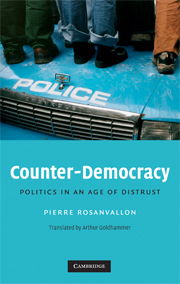14 - Conclusion: the modern mixed regime
Published online by Cambridge University Press: 24 May 2010
Summary
Our exploration of the counter-democratic universe has shown that we need to reconsider familiar ideas about the retreat of citizens from the public sphere and withdrawal into private life. It has also encouraged us to take a broad view of the problems and dysfunctions of contemporary democracies and to look at dimensions other than the electoral-representative. In particular, we have seen a contrast between the development of counter-democratic forms and the demise of certain political functions. What is needed is a new and more complex description of the context in which democratic politics takes place. We have identified three dimensions of democracy, each with its own distinctive characteristics: electoral-representative government, counter-democratic activity, and the institution of civil society by the political (le travail du politique). Of these, the first has been studied most frequently and carefully, with an emphasis on the various principles and procedures that govern citizen participation, expression, and representation, along with the legitimation of authority and the various mechanisms by which government is made both responsible and responsive to society. The second dimension of democracy, the counter-democratic, is the subject of this book. It includes a range of practices (which I have categorized as oversight, prevention, and judgment) by which society exerts pressure on its rulers. Counter-democratic practices give rise to informal, parallel forms of authority, or corrective powers (exercised directly in some cases and through ad hoc institutions in others).
- Type
- Chapter
- Information
- Counter-DemocracyPolitics in an Age of Distrust, pp. 290 - 318Publisher: Cambridge University PressPrint publication year: 2008

